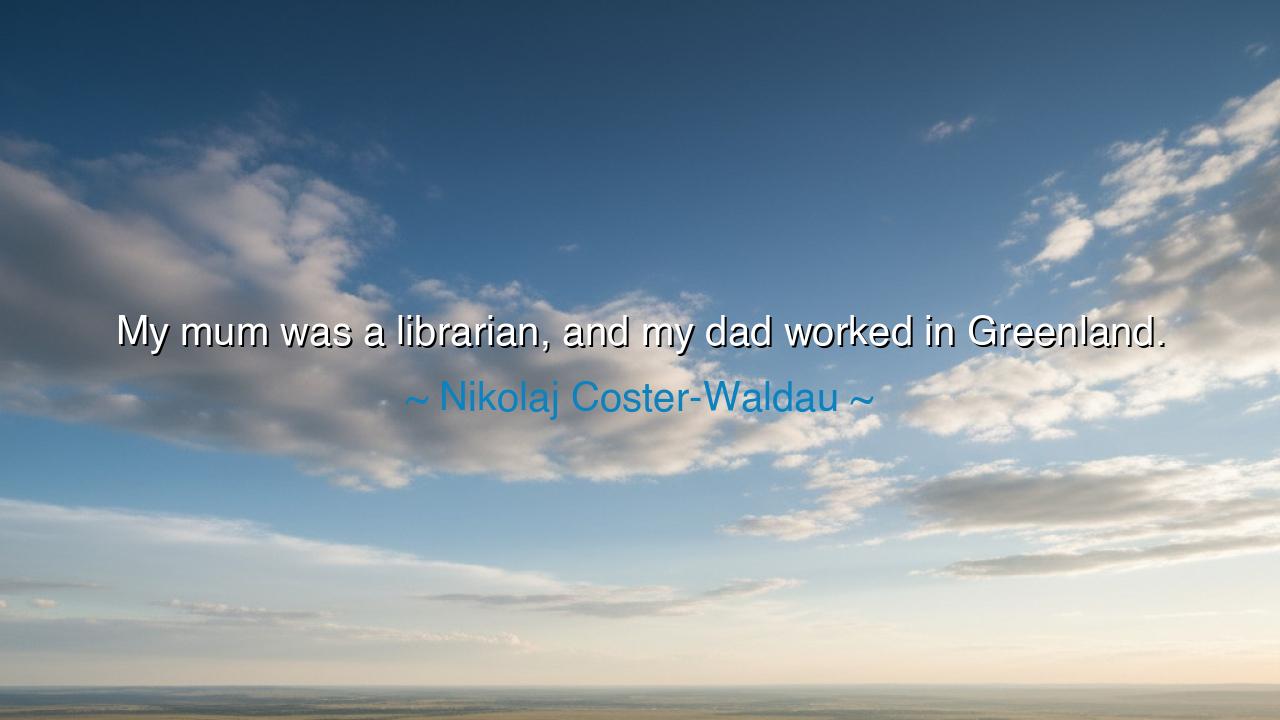
My mum was a librarian, and my dad worked in Greenland.






“My mum was a librarian, and my dad worked in Greenland.” Thus spoke Nikolaj Coster-Waldau, the Danish actor known to the world for his commanding presence on screen, yet whose roots lie not in grandeur, but in humility. At first glance, these words seem plain, almost domestic — a simple recollection of parentage. Yet within them stirs a quiet depth, a reflection on the forces that shape a human soul. In this brief remembrance, Coster-Waldau reveals the twin foundations of his being: knowledge and endurance, imagination and isolation, the union of the quiet world of books and the stark, untamed vastness of nature.
To say that one’s mother was a librarian is to acknowledge being raised in the house of words, among stories that whisper wisdom from every age. The librarian is not merely a keeper of books, but a guardian of civilization’s memory — one who knows that the past is a lantern that lights the way forward. From his mother, Coster-Waldau inherited the reverence for stories, the discipline of learning, and the deep understanding that knowledge, like a flame, must be tended with patience and humility. The library, with its silence and its shelves of dreams, was his first kingdom — a place where imagination could roam freely before fame and fortune ever called.
And then there is the father, who worked in Greenland — that far and frozen realm, where the earth meets ice and the sky stretches like eternity. The father’s world was one of solitude and endurance, of labor beneath a merciless horizon. From him, the young Nikolaj would learn the strength of silence, the dignity of work, and the nobility of perseverance. Greenland, with its cold winds and vast spaces, teaches a truth opposite yet equal to that of the library: where books give warmth to the mind, the frozen wilderness hardens the will. To have roots in both is to carry within oneself the balance between thought and action, between dream and duty.
Thus, in this simple memory — “My mum was a librarian, and my dad worked in Greenland” — we glimpse the making of a man shaped by contrast. His mother’s world was inward and ordered; his father’s, outward and harsh. From the mother came reflection, from the father, resilience. And it is at the meeting of these worlds that greatness often arises. For as the ancients taught, a tree that grows both deep roots and strong branches can withstand any storm. The mind must be nourished by wisdom, and the body by toil; the spirit must learn both tenderness and endurance.
Consider how many of history’s giants were forged in such duality. Leonardo da Vinci, raised amid both the arts and the sciences, married beauty with invention. Abraham Lincoln, born in poverty yet steeped in books, joined the endurance of the frontier with the eloquence of intellect. So too does Coster-Waldau’s remembrance speak of this eternal pattern: that greatness is not born of comfort, but of contrast — the meeting of knowledge and hardship, of imagination and reality. It is from such opposites that the soul gains its full dimension.
Yet there is something deeply human in his tone — not pride, but gratitude. He does not boast of lineage or privilege, but honors simplicity: a mother of books, a father of labor. His words remind us that one’s beginning need not be grand to be worthy. The librarian and the worker are as noble as any king and queen, for they built in their son the foundations of wisdom and endurance — virtues rarer and more enduring than gold. In the stillness of his mother’s library and the isolation of his father’s Greenland, he learned both how to imagine and how to endure, and in this, his artistry was born.
So, my children, take this teaching to heart: honor your origins, however humble, for they are the soil from which your strength grows. Knowledge without endurance is fragile; endurance without knowledge is blind. Seek both — the wisdom of the library and the courage of the frontier. Let your mind wander in wonder, and your heart stand firm in hardship. For the one who can dream deeply and endure quietly holds a power greater than fame: the power to remain whole in a divided world.
In the end, Nikolaj Coster-Waldau’s words are not a mere biographical note, but a quiet ode to the forces that shape character. They remind us that greatness often begins in small, unnoticed places — in the hush of a library, or in the solitude of the frozen north. So let each of us remember where we come from, and let gratitude guide us. For no matter how far we travel, the wisdom of our mothers and the strength of our fathers travel with us — like the steady rhythm of the tides beneath the ice, unseen but eternal.






AAdministratorAdministrator
Welcome, honored guests. Please leave a comment, we will respond soon